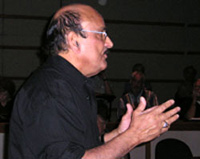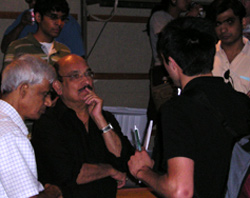Physicist says Hindu scriptures can solve modern problems:
Environment, personal, global strife
July 6, 2007 - A broader perspective gives people the ability to solve small- and large-scale problems, physicist Dr. G. Lakshman said July 6 during a visit to MU. He believes the ancient Hindu scripture, the Bhagavad Gita, guides people in developing that perspective.
He cited a Hindu axiom: "You cannot solve a problem at the same level the conflict is created."
 |
| Dr. G. Lakshman addressed an audience of about 75 at MU's Tucker Forum on July 6, 2007. |
Lakshman addressed the idea in a noon lecture open to the campus and community, as well as a presentation to select MU faculty earlier in the day.
"You have to get out there (looking down at the problem from a wider perspective)," Lakshman said. "You see and hear other things than you have before."
The noon lecture focused on how changes to the human psyche in the modern age lead to societal unrest; the morning discussion focused on applying lessons from the Bhagavad Gita to issues of environmental sustainability.
The noon lecture was presented by the Cultural Association of India and hosted by the MU Center on Religion & the Professions. The morning discussion was organized by the Center on Religion & the Professions.
Lakshman, a physicist by training, was initially agnostic. A few years ago, he began reading the Bhagavad Gita, a Hindu text believed composed about 5,000 years ago. "I got hooked on the Gita - and I haven't finished it yet!" Lakshman said at the noon lecture. Though he said he is not an expert on the Gita, he believes he offers an understanding of it that can help solve society's ills.
His understanding of some of those problems came from 18 years as a principle research scientist at the Saskatewan Research Council, working on environmental biotechnology, sustainable development and hydrology. In 1986, Lakshman established System Ecotechnologies Inc., an environmental biotechnology company at Innovation Place, a prestigious research park on the University of Saskatchewan campus. He recently participated in a multi-faith conference on faith-based resolutions to ecological problems.
Lakshman revived part of his address at that conference in his presentation to MU faculty, including Dr. V.S. Gopalaratman (Civil Engineering), Dr. Jim Scott (Director of the MU International Center), Dr. H.R. Chandrasekhar (Physics) and Dr. Bob Baum (Religious Studies), as well as Monta Welch, director of the Columbia Climate Change Coalition.
Hinduism provides a picture of the universe that is vast, as well as made up of specifics, Lakshman said. It believes that a "divine" force ("God," "cosmic consciousness") created the universe, embedded with natural laws that bind all within it. Everything created contains part of that cosmic consciousness. Thus, everything created should be treated with reverence.
From an environmental perspective, that means practicing societal responsibility and acknowledging the "divinity" in all creation. "It is not enough to respect nature," Lakshman said. "It is important to revere nature." Hindu worship includes offerings of fruit and flowers which, in essence, allow vegetative life to participate in worship, he said.
"Man is not a master to exploit," he said, "but has a great responsibility using superior intelligence. Man is God's custodian."
 |
Dr. G. Lakshman talked with people and answered questions after the noon event. |
The modern view toward the environment won't change, however, until people change their value system, Lakshman said. Insatiable appetites for new artifacts lead to desire for a sense of euphoria, a self-centered need to acquire at any cost, and then insensitization, he said. Drives for "wealth, prestige and power" are what has led to environmental crisis, he said.
In his noon lecture, Lakshman talked about how "sensory overload" and a society built on science and electronics is changing the human psyche. The Bhagavad Gita, he said, shows people how to analyze their psyches, to help them connect with their inner consciousness and move toward "right" thoughts and actions. "Even for a person who is agnostic, atheist, or follows any kind of faith, the Gita has an answer," he said.
Crisis is caused by selfish action, greed, malice, arrogance, aggression, power, glamour, envy and other pathological values, Lakshman said. "(The Gita) teaches how to cultivate human values - love, truth, nonviolence, peace and right action." Understanding the connection between knowledge, the psyche and behavior leads to a place of greater perspective, where "prejudices and likes and dislikes are gone," Lakshman said. "The vantage point is the wisdom that's giving you the strength to take the right action."
Feeling genuine empathy for other people and creatures is the solution to many problems - from youth crime to the environment to global conflict - and is a value one can learn from the Bhagavad Gita, Lakshman believes. This includes seeing the world from a wider perspective and individuals as interactive parts. "You must think about the impact of actions on others," he said. "Spirituality is giving up (something) so that others can have better." This requires restraint, a "ceiling on desires" and a sense of universal oneness, he said.
"We need a paradigm shift in how we define priorities and happiness in life," Lakshman said at the morning discussion. Those in the faith community can work toward that end, he said. "There is a tremendous interest in finding out what faith can do to develop our empathy," he said. This includes faith leaders and believers acting as role models, teaching values, believing the principles and acting.
The goal would be to have a sense of cosmic consciousness "inspired from the inside, not (just) tutored from the outside," Lakshman said. Acting with a sense of interconnectedness and concern for the impact on others is key, he said, and will always guide one toward right thinking and action, even when a problem is not 100 percent or permanently solved.
Religion, he added, is supposed to give people two things: courage and hope. Belief in those values can move people from self-destruction to spiritual transformation, he said.
About 75 community members and MU students, faculty and staff filled Tucker Forum past capacity for the noon event. The Cultural Association of India provided refreshments.
.
|